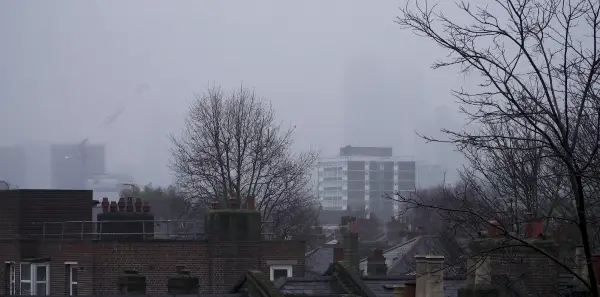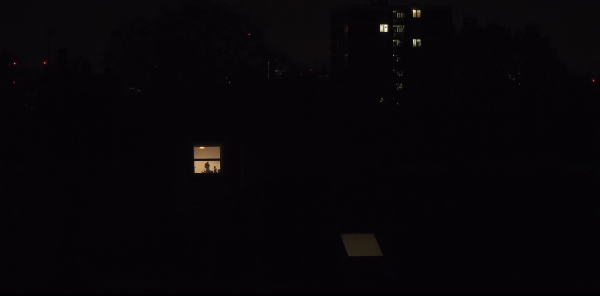CITADEL: London In Lockdown

Luke Parry is film student who has recently graduated from…
John Smith’s Citadel perfectly captures the United Kingdom’s 2020. Beginning with a boisterous Boris Johnson, still bouncing from his general election win, and ending with the worst COVID-19 death toll in Europe.
The story of the country’s battle with the Coronavirus pandemic is told both visually, with shots of the capital’s skyline and buildings, but also through the words of the prime minster. Smith seamlessly pinpoints vital statements that Boris Johnson made, setting them against powerful shots from his window.

This presents the government’s first reaction to the emerging health crisis in 2020, protecting big business. Smith appears to criticise this, with his use of quick cuts and unconventional editing that flashes the tall buildings into frame as Johnson says “buy”, and hides them behind the mist when he says “sell”. They will take, but not give back. This is certainly a concept that has been highlighted during the pandemic.
Lockdown Gloom
After the country’s leaders realised that the COVID-19 pandemic was going to be a huge issue for the country, the United Kingdom entered lockdown in March 2020. The bleak, dark, and lonely nature of the months that followed are expertly represented by the following sequences of Citadel.
The film documents London’s transition into lockdown, moving from shots of the city as a whole to individual houses and back gardens. In an interview with bfi.org.uk, Smith explains the way in which he wanted to “capture the melancholy of watching people through their windows, a kind of moroseness in their postures and actions”. This is something he carries off very well. The shots of people washing up, exercising, and going about their daily business alone present the restrictive and lonely nature of the lockdown. Filming these shots at night only adds to the effect of the gloom and claustrophobia too, as locked down citizens are trapped in the darkness.

The Winter Lockdown
We then return to shots of London in the daytime, once again seeing the whole of the London skyline. However, although this sequence begins in the summer, we quickly cut to a winter, snowy London, with the big buildings once again hidden in the mist. This is the beginning of the second lockdown, as once again the UK returned home to slow down the rate of infections. Sounds of construction work over the top of these snowy shots could be Smith commenting on the class injustices and imbalance that the COVID pandemic has presented. Whilst big business is hidden in the mist, and out of view, people with manual and generally less well-paid jobs still had to continue. They were not able to quarantine, or put their family’s health before their job.

Pandemic Filmmaking
Another way in which Smith’s Citadel is interesting is the way in which despite lockdown restrictions, it is still able to accurately and truthfully represent the story of the UK’s 2020. It shows how creative filmmaking is able to withstand any challenge or restriction. A large amount of avant-garde and experimental filmmaking is about challenging and criticising those in power and presenting the impact of their decisions and actions. However, what’s interesting about Citadel is that it is a film that is directly affected by the events of 2020. The filmmaker himself was trapped in his home during the lockdowns. Therefore, this is not a film that is expressing a view of life during the pandemic, constructed by a writer, director, and editor, it is a film that in itself was restricted by the very crisis that is its subject.
Summary
Overall, John Smith’s Citadel is a perfect cinematic reflection of the difficult 2020 that the British public dealt with. From Johnson’s contradictions and lockdown decisions to the harshness and gloom of multiple lockdowns.
What did you think of Citadel? Let us know in the comments below!
Watch Citadel
Does content like this matter to you?
Become a Member and support film journalism. Unlock access to all of Film Inquiry`s great articles. Join a community of like-minded readers who are passionate about cinema - get access to our private members Network, give back to independent filmmakers, and more.
Luke Parry is film student who has recently graduated from the University of Gloucestershire. He loves to write about movies and has a passion for film history and film theory.













